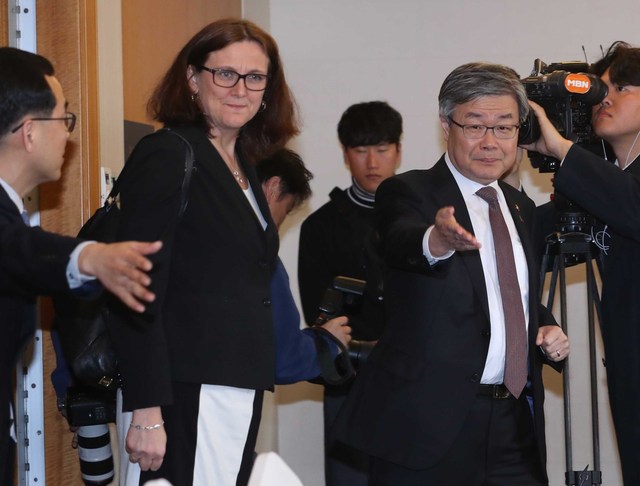 |
|
South Korean Minister of Employment and Labor Kim Jae-kap (right) with European Commissioner for Trade Cecilia Malmstrom at the Lotte Hotel in Seoul on Apr. 9. (Park Jong-shik, staff photographer)
|
European trade commissioner meets with labor minister and labor committee chairman
The European Union (EU) is stepping up pressure on South Korea by setting a firm deadline for the ratification of core International Labour Organization (ILO) conventions. Meeting on the afternoon of Apr. 9 with Liberty Korea Party (LKP) lawmaker and Environment and Labor Committee Chairman Kim Hack-yong at the National Assembly, European Commissioner for Trade Cecilia Malmstrom said she was “curious” whether ratification of the ILO core conventions as pledged in the South Korea-EU Free Trade Agreement (FTA) would be achieved before summer or completed at all. In addition to her meeting with Kim, Malmstrom had a busy schedule the same day, meeting with Minister of Employment and Labor Kim Jae-kap and attending the eighth South Korea-EU Trade Committee meeting and a talk with reporters as she called on the South Korean government and National Assembly to swiftly ratify the conventions. During her meeting with Kim, she gave the coming summer as a deadline. “I had heard explanations on what the South Korean government has been doing [before arriving in South Korea], but I wanted to meet and speak with you directly with regard to the ratification deadline,” she told Kim. In response, Kim said, “While it would be good if [the ratification] can happen before the summer, there are a number of special characteristics to South Korea and many issues that will require adjustments to domestic laws before the agreements are ratified.” “It is difficult for me to assert that it can be passed before the summer,” he continued. His remarks indicate a growing likelihood that the EU will move to refer South Korea to an expert panel as a dispute procedure if the amendment of labor laws is delayed or the amendments violate ILO standards. In a subsequent closed-door meeting, Kim reportedly said the matter “requires societal detail and sufficient discussion” and that “European standards cannot be applied [directly] to South Korea.” In response, Malmstrom was reported as saying, “We have never forced European standards on any country. We also hope South Korea will take into account the fact that countries that have ratified core conventions have experienced improved corporation competitiveness and improved reputations.” The actual level of the EU’s response appears likely to be decided after Malmstrom’s delegation returns to the EU headquarters in Brussels. According to the South Korean Ministry of Employment and Labor, Malmstrom said in her meeting with Lee that “the convening of an expert panel [as the second stage of dispute resolution procedures] will be unavoidable if there is no visible progress toward ratification in the near future.” S. Korea may become first FTA country in dispute over labor rights If South Korea is referred to the expert panel, it will be the first country facing a dispute over labor rights in the history of FTAs. Based on its assessment of the South Korean labor rights situation, the panel could publish a report recommending corrective action by the government. While the EU would not be able to adopt direct retaliatory trade measures in this case, it could create a burden by demanding the core conventions’ ratification as a precondition each time South Korea demands greater European market openness going ahead. With European companies facing due diligence obligations, some could take issue with doing business with counterparts in South Korea if the core conventions are not ratified. “The EU has explained this and clearly spelled out the disadvantages for South Korean companies,” said a Korean Confederation of Trade Unions (KCTU) official who attended a closed-door meeting with the EU delegation’s legal affairs staff. But in a talk with reporters later, Malmstrom stressed that the EU’s basic position is to avoid a dispute. “If the expert panel is convened and issues recommendations, they will have binding force in the different countries,” she continued. “When things proceed to dispute resolution procedures, the countries’ reputation suffers severe damage, so we’re trying to resolve [the ratification issue] before that happens.” By Cho Hye-jeong and Kim Mi-na, staff reporters Please direct comments or questions to [english@hani.co.kr]






